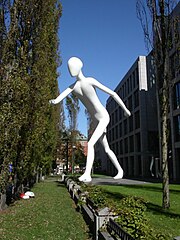Next in our tour of Munich neighborhoods to plunder for inspiration is Schwabing. The most relevant information is that it used to be the artists' quarter of Munich back in the 19th century (and we are going for an 19th century feel, after all). And even today there is some interesting artwork, like this guy:


Now, while in our world this was only built in 1995 for the Munich Re reinsurance company, there is absolutely no reason why we can't have giant humanoid statues in Bodenwald even if they are technically "anachronistic" (as if I'd care about that). To make it even more interesting, let's say this statue was originally found on the planet Surtus, with its exact features having been weathered away beyond the ability of magic to restore. In the inimitable way of 19th century archaeologists, the discoverers promptly smashed it to bits in the hopes of finding some treasure, and then transported the broken pieces back to Bodenwald where they were reassembled and put in front of the local art academy (since it wouldn't fit into the sculpture museum mentioned in an earlier post). Surely no vengeful alien spirits will rise up as a result of this sacrilege.
There is also the Studentenstadt Freimann, Germany's largest "student settlement" with a capacity for 2478 students, but once again I think this would thematically be a better fit for the city-state of Praxus.
We also have a historical character who can serve as an inspiration for a noteworthy NPC: Fanny zu Reventlov, also known as the "Scandal Countess" during her lifetime for both her noble title and her lifestyle (which, back then, meant first divorcing her husband and later having a son by an unknown father without being married), although she is mostly known for her satirical writings.
For one thing, Urbis needs more female NPCs. For another, while I've decided to base base Urbis on late 19th century society and mores which also includes a certain amount of that era's appalling sexism, it will be useful to have female NPCs ignore society's disapproval when living their own lives and getting away with it. I might give the "Fanny" of Bodenwald some additional capabilities so that there is less temptation to put her into the "Damsel in Distress" role - since the "real" Fanny studied Art, maybe her counterpart is an accomplished illusionist?
And speaking of authors and satirical writings, Schwabing was also home to the Simplicissimus, Germany's most famous satirical magazine. Something like it must certainly be included, as having the press cover the activities of the PCs is one of the most fun things a GM can do in their campaign, and how much more fun will it be if the PCs get skewered by a satirical magazine? Well, given how PCs are prone to making their displeasure known with violence, let's hope that the editors all have life insurance...
The next district in our list is Au-Haidhausen, another riverside district. It was historically the site of numerous breweries, inns, pubs, and so-called "Bierkeller" (lit. "beer cellars", largely open-air places serving beer and simple, cold dishes). It also houses the Bavarian parliament (I did say that beer and politics go together in a previous post, didn't I?). Its so-called "French Quarter" is not actually named like this because many French people live there but because its streets were named after the sites of victorious battles in the Franco-Prussian War - a charming custom which I think I will leave to more militaristic city-states such as Zuidenstadt.
One prominent local custom is the ceremonial opening of malt liquor barrels ("Starkbieranstich") at the Nockherberg terrace. This takes place during carnival and comedians are invited to make fun of prominent politicians, many of which will be in attendance - sort of like the White House Correspondence Dinner, only with more beer. This event has sparked at least one riot in the 19th century, and for Urbis purposes it might trigger conflicts when one of the politicians in attendance vows revenge for some slight committed that evening...
Finally, one local institution is the Sudetendeutsches Haus, which houses various organizations representing the Sudeten Germans - ethnic Germans who lived in parts of Czechoslovakiaand Poland until they were driven away after WWII. While this particular event hasn't happened in Urbis, exiles from the Kingdom of Gorchov - now the Sunset Province - could fulfill a similar role and lobby for the rights and support of their fellow countrymen.
To be continued in Part V.
No comments:
Post a Comment